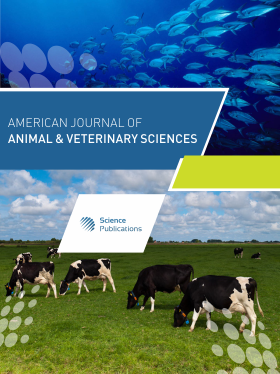Genetic Diversity of Red Chittagong Cattle Using Randomly Amplified Polymorphic DNA Markers
- 1 Bangladesh Livestock Research Institute, Bangladesh
- 2 University of Dhaka, Bangladesh
Abstract
Problem statement: Red Chittagong Cattle (RCC) is a potential genetic resource in Bangladesh having dairy potentialities, high resistance to disease and survive harse environmental condition while require low input supply. This resource is now disappearing due to indiscriminate crossing with other local and exotic cattle. To conserve this resource, find out the genetic diversity of RCC is prime concern. Approach: To determine the genetic variation of Red Chittagong Cattle and to find out the genetic present status for their future improvement and conservation program. The experiment was conducted in the Molecular Genetics Laboratory under Animal Production Research Division, Bangladesh Livestock Research Institute (BLRI), Saver, Dhaka, Bangladesh. DNA was extracted from 100 RCC blood samples and the extracted DNA was observed by gel electrophoresis. Randomly 16 primers were tested among them three primers were matched and found polymorphic. Random Amplification of Polymorphic DNA-Polymerase Chain Reaction (RAPD-PCR) analysis was carried out using DNA samples of RCC. Only unambiguous, reproducible and scorable polymorphic fragments were taken into consideration for analysis. Data were analyzed by using a computer program POPGENE (Version 1.31). Results: The highest and the lowest level of gene frequency value (0.9590 and 0.0440) were observed in allele 0 and 1 with BMC1222-2 locus and only one monomorphic locus (OPB07-1) was found. The Nei’s gene diversity and Shannon’s information indicated that the highest and the lowest diversity were found in Anwara (0.2925) and Chandonish (0.2147) respectively. The pair-wise mean genetic distance value ranged (below diagonal) from 0.0092-0.0279. The minimum distance was found between Satkania and Chandonish. On the other hand maximum distance was found between RCC BLRI and Potia. The dendrogram segregated the five population of RCC into two clusters: RCC BLRI and Anwara is one cluster whereas Satkania, Chandonish and Potia made another cluster. Conclusion: The genetic diversity of RCC is relatively higher for a prescribed breed and therefore, have an opportunities to improve them using selective breeding like ONBS.
DOI: https://doi.org/10.3844/ajavsp.2009.1.5

- 7,039 Views
- 5,705 Downloads
- 3 Citations
Download
Keywords
- Red chittagong cattle
- RAPD
- PCR
- genetic variation
- genetic distance
